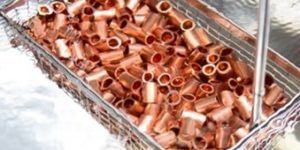WALK THE TALK
Performance Profile: The founder of this new and used machine tool supplier, never seeking to comply with the norm, has taken the concept of the small-time dealer, the broker who spends all of his time on the phone buying and selling, and completely blown it apart.
Posted: June 10, 2009
If Rich Piselli was to write a book on running a successful business, it would probably be titled Trust, with chapters such as "Keep Your Word" and "Stay Focused" and "Don't Waste People's Time." The conclusion? The subject would be on the importance of building and maintaining a good reputation.
"In this business, all you really have is your reputation," says Piselli, who is the president and founder of R.P. Machine Enterprises, Inc. (Statesville, NC). "If you don't do what you say you're going to do, word gets out. So you've got to keep your promises. There's just no other way."
Piselli began acquiring this knowledge back in 1989, when he shifted from the Oriental import/export business to buying and selling used equipment for a company called U.S.A. Machinery. He quickly noticed that each of the salesmen specialized in certain types of equipment, but they all tended to shy away from gear machinery. "Not many guys understood gear equipment, because these are unusual machines," notes Piselli. "They're not like a simple lathe or a mill. They're more intricate. So I decided to take advantage of the situation and make that area my own. When I started with U.S.A., they had maybe three or four gear customers on the computer, so I took that and just ran with it. I made some good contacts and sold some gear machines that nobody else knew anything about."
The downturn of the U.S. economy took its toll on the company, which closed its doors in the early nineties, leaving Piselli to consider what his next career move would be. He'd managed to pull together a solid network of gear-machine buyers and sellers, and he decided that he wanted to continue building on his work. He approached a friend ? who owned a gear-cutting shop in Cleveland and had bought some machines from him in the past ? about housing a couple of used machines, and the venture went well. Piselli's confidence in the market grew to the point that he realized he needed space of his own.
"I'd been working out of an office in New York and traveling to Cleveland when a customer needed to see a machine, but I felt like it was time to consolidate my activities and my inventory. So I started looking around for a good place to do that," he recalls. On a visit to Statesville ? just outside of Charlotte ? Piselli fell in love with the area, and not only for its natural beauty, but due to the positive and supportive business climate. "It's very pro-business here," he says. "Plus it's a great distribution location, since it's easy for the trucks to get in and out with Highways 77 and 40 right nearby."
Piselli bought his first building in 1995, with some 50,000 sq ft of warehouse space. "We jumped right into it," he remembers, "and before you knew it, we had that building filled up with machines. Since then, our business has just taken off. We never missed a beat ? we've never had a downturn."
Since that day, Piselli's real-estate holdings have grown to the point that he now owns more than 700,000 sq ft of commercial space ? much of which he leases to other businesses ? and has recently added an additional 400,000 sq ft. "It's not that we're dying to just keep getting bigger and bigger, because things can get out of hand," he explains. "In fact, working with a set amount of space forces you to buy smarter. But I see growth as a sort of necessary evil at this point, because it's what we're going to have to do to be able to move up to that next level."
That level, he explains, involves a number of operations and services that the company has recently begun to pursue, such as retrofitting and recontrolling older machines. "These are machines that have good metal and good ball screws, but their controls have become obsolete," he says. "What we're doing is putting in new state of the art controls, and what we end up with is a crackerjack machine for a third or half the price of a new one."
Retrofitting older machines is a natural progression for the company, Piselli says, since it has never sought to comply with the norm. "We have taken the concept of the small-time dealer, the broker who's spending all of his time on the phone buying and selling, and completely blown it apart," he says. ?Because with gear equipment, you can't just sell the machine. There's so much more going on, in terms of tooling, fixturing, and support, that you need to be able to offer a complete package. And that's what we're able to provide ? a complete, turnkey package."
In addition to used equipment, R.P. Machine now offers new equipment as well, and it has recently entered into a relationship with New England Gear to sell its line of shapers and Gear Spec's CNC testers, and CNC-recontrolled Reishauer gear grinders. "At this point, probably 70 percent of our business involves used machines, and 30 percent is new and retrofitted equipment," he explains. "But that may shift to 60/40 in the coming year because retro-machine sales are going so well."
In addition to Gould & Eberhardt, Pfauter, Liebherr, Mitsubishi, Gleason and other gear-related machinery, the company imports new gear hobbing machines from China and outfits them with new CNC controls that result in a never-used machine with the full range of gear-cutting capabilities and at a significantly lower purchase price. "These are phenomenal niche machines, but at a fraction of the cost of other machines,? remarks Piselli.
Even more than its extensive inventory and ever-growing list of services, the company's approach to doing business sets it apart from the crowd. "We're pretty aggressive, but that's because we're confident about what we sell and what we do," says Piselli. "But the most important thing of all ? and what I think we're known for in this business ? is that we do what we say we're going to do. You've got to be straight with people and you can't waste their time. As a result, I'd say that 80 percent of our business is repeat business, and that's unheard of in this industry . . . unheard of."
When buyers contact Piselli to ask what he has in stock, he turns the question around. "I say 'never mind what I've got, what do you need?'" he says. "I ask them to tell me what kind of machine they're looking for, what they want it to do, and what they're planning to spend on it. That way, I'm not wasting their time, they're not wasting my time, and we can get them up and running that much faster."
With a global network of connections ? R.P. Machine's customer base stretches across the U.S. and even into countries including Germany, Japan, Korea, and China, among others ? Piselli has even fielded queries from customers seeking employees. "I really see that as a compliment," he says. "When somebody buys a machine from me and then asks me to help them find a machine operator or whatever, that says they trust me. There's no telling how many guys I've gotten jobs for."
This willingness to go beyond the typical bounds of the buyer/seller relationship is central to the company's philosophy, he says. "When we sell a machine, we stand behind it 100 percent. If the machine breaks down, we'll send in a technician to set things right, and if it still isn't working out, we'll take it back and send them another one."
Piselli says that, of the millions in inventory he keeps on hand, he has a back-up for 90 percent of the machines. "Duplication is essential in this business because I've got to have something to offer a customer in case he decides that the original machine isn't working out, for whatever reason," he says. "I've also got to have replacement parts in stock, because parts can cost as much as the machine, sometimes, especially if you have to go to the manufacturer."
This aspect of the business also takes up a significant portion of the company's warehouse space. "To be honest with you, I'm always on the lookout for what you might call 'white elephants,'" Piselli says. "If it's too old or worn out to keep operating, we'll break it down for parts. But I also know that when somebody's looking for an offbeat machine, they're going to come to me. Sooner or later, I'm gonna sell that machine."
Advertising is essential to making people aware of his company's stock and services. As an example, Piselli recalls an incident where a potential customer that was located right down the road from him that he'd been trying to work with for months, if not years, finally called him one day out of the blue. "I went to see the guy and I said, 'how'd you find out about me?' He holds up a magazine and points to our ad," Piselli laughs. "I'd been knocking on his door forever, and he finally calls me because he remembered seeing our ad! You've got to get your name out there, and not just once," he says. "You've got to keep it out there. And if you do that, people are going to remember it and call you."
Still, Piselli says he places the most emphasis on his reputation as a means of spreading the word about his company. "I like for people to think well of the company and what we do," he says. "I want them to have a good experience with us, and to know that we'll be there for them, no matter what. We want to be seen as the 'go-to' guys."
It's never too early to begin working on this relationship, he adds. "If a company's just starting up, I'll tell them to give me a third down and I'll keep their machines on my floor. We'll take care of the balance once their building's finished," says Piselli. "In the meantime, we'll be working on those machines, getting all the tooling and the parts ordered so that when those machines hit the floor, they'll be running."
Although he spends the majority of his time in the office, Piselli usually travels once or twice a month, calling on his customers and scouting out good buys ? not only on equipment, but entire factories. "One of our first big deals ? one that really helped put us on the map ? involved a company called Cambridge Gear up in Ontario," he recalls. "When we first bought the company, we were planning to keep it running and get in the gear-cutting business. But once we learned more about the unions and other complications that we really didn't want to get into, we decided to break the company up and sell off its assets, including the machines. We ended up doing very well with that, but it had people going 'who is this Piselli guy? Where'd he come from?'"
In a larger sense, the answer is New York, where Piselli grew up in a family that placed a premium on hard work. "I know it's a cliché, but I've always gone at things 110 percent," he says. "I believe that if you work hard enough, you create your own good luck."
In addition to this strategy, R.P. Machine has always made a point of reinvesting its earnings back into the company, building its inventory and expanding its services in order to better meet its customer's needs. Another key component of the company's success is the attention paid to "staying focused."
"When I first started this company, it was just me," Piselli says, adding that he now has eight employees and a long list of proven contract technicians on call. "And I've had to learn everything about running a business on my own. But even once you're dealing with payroll and inventory and bank payments and all the other headaches, you've still got to stay focused on what you originally set out to do. When times get tough, you've got to remember your commitment to the customer, to doing things right and keeping your word. I've seen plenty of guys who started their own businesses end up being overwhelmed by the responsibility and losing their minds and shutting down the shop. You must be able to multitask ? that's essential to being successful in this business."
Piselli also believes that it's important for the company to have a presence at the industry's various trade shows. "We're a member of AGMA and MDNA," he says. "We've displayed at Gear Expo for the past six years running. We've had a booth at the last three IMTS shows. Even though we might sell a machine or two while we're there, just enough to cover our expenses, that's really not why we go. We want to say hello to our customers, to spend some time with them, and we also owe it to them to prove that we're serious about being a player in this industry.
"It also gives me the opportunity to tell potential customers that if they'll give us a shot at their business, we'll be there for them from that point forward," says Piselli. "And when we give somebody our word, they can take that to the bank."
Now a multi-million-dollar company, RP continues to focus on the sale of both new gear machinery for wind energy production and mining, as well as retrofitted gear machines. Their latest development (PME, a sales solution division) is their design for a five-axis machine for precision machining of hubs, base plates, and blades for 1.5, 2.5 and 3.5 megawatt wind turbines.
In 2Q of 2009, the company expanded again, acquiring the Statesville Division of Alpha/Sullivan Steel. The acquisition provides RP with a superior magnetic division that now allows RP to offer a line of magnetic lifting devices, fixturings, tables and chucks. Not to mention contract machining and grinding up to 144 in diameter.
– – – – – – – – – – – – – – – – – – – – – – – – – – – – – – – – – – – – – – – – –
R. P. Machine Enterprises, 820 Cochran Street, Statesville, NC 28677, 704-872-8888, Fax: 704-872-5777, www.rpmachine.com .
New England Gear Company, 343 John Downey Drive, P.O. Box 1120, New Britain, CT 06051, 860-223-7778, Fax: 860-223-7776, www.newenglandgear.com .














